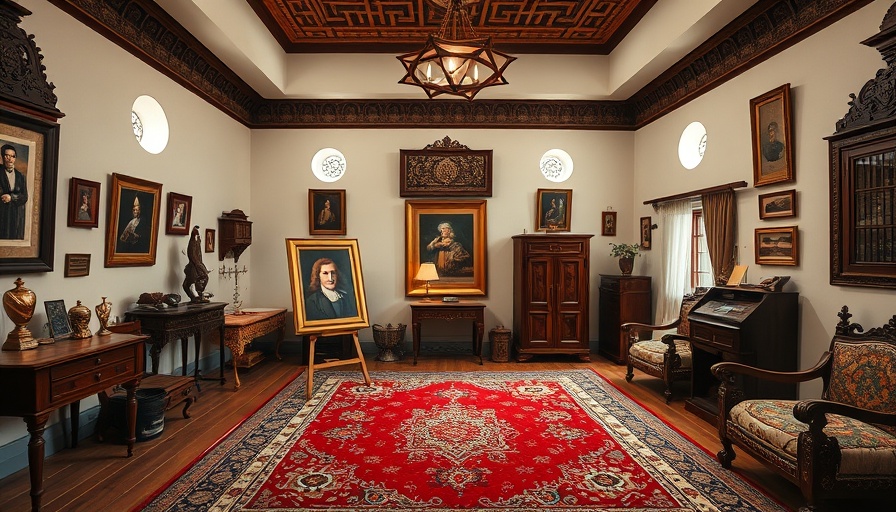
The Restoration of Cahal Synagogue: A Cultural Renaissance in Morocco
As the sun sets over the narrow alleys of Asila, a small coastal town in Morocco, the Cahal synagogue stands as a symbol of resilience, history, and the importance of cultural heritage. Recently registered as a state heritage site, this centuries-old structure has undergone a meticulous restoration process that not only revives its architectural beauty but also breathes life back into the storied past of Moroccan Jews.
In 'Historic synagogue recognised as Moroccan state heritage site', the discussion dives into the importance of preserving cultural landmarks, exploring key insights that sparked deeper analysis on our end.
A Historical Tapestry: Jewish Heritage in Morocco
Moroccan Jews have been an integral part of the country's cultural fabric since Roman times, with their roots tracing back to ancient civilizations that flourished long before the establishment of modern Morocco. The Cahal synagogue, built in 1824, represents this vibrant history—a time when Jewish communities thrived and contributed richly to the Moroccan social and economic spheres. Today, the synagogue serves as a physical testament to the coexistence of pluralistic cultures in North Africa.
The Journey of Restoration: A Community Effort
The restoration of the Cahal synagogue was a community-driven initiative, spearheaded by local residents who felt a deep connection to their heritage. Upon discovering the synagogue in a state of disrepair, community members began sketching its original form and envisioning its revitalization. This collaborative spirit not only reestablished the synagogue’s structural integrity but also reinstated its significance as a center of worship and community gatherings.
Artifacts and Remembrance: Preserving Identity
Visitors to the Cahal synagogue are met with a rich collection of artifacts that narrate the story of the Jewish community in Asila. From meticulously preserved marriage certificates to dated religious objects from closed synagogues, each piece showcases Moroccan Jewish history. An authentic wooden ceiling, traditional lighting, and old carpets contribute to the synagogue's sacred atmosphere, reminding visitors of the people and traditions that once thrived within its walls.
Faith and Purity: The Significance of Mikvah
The restoration project also included the revitalization of the synagogue’s mikvah, or ritual bath, which plays a crucial role in Jewish spiritual practice, symbolizing purification and renewal. The reinstatement of this essential element allows the community to reclaim its religious practices, fostering a deeper connection to faith and tradition.
Recognition and the Future: A State Heritage Site
Two years of hard work culminated in a remarkable achievement: the Cahal synagogue, along with its cemetery and ritual bath, were officially recognized as state monuments by Morocco’s Minister of Culture. This landmark decision marks a significant step toward acknowledging the importance of Moroccan Jewish heritage. It emphasizes the need for preservation and encourages cultural appreciation amid Morocco’s diverse population.
Cultural Reflection: Bridging Gaps in Understanding
Recognizing Moroccan Jewish cultural sites such as the Cahal synagogue is more than just an act of preservation; it is a moment for reflection on the nation’s complex history. The revitalization of the synagogue serves as a reminder of the rich, multicultural identity of Morocco. By celebrating this heritage, locals and visitors alike can foster dialogue, appreciate shared histories, and build bridges across different cultures.
Moving Forward: The Role of Heritage in Society
The acknowledgment of the Cahal synagogue as a state heritage site fosters hope. It presents an opportunity for similar cultural treasures across Morocco to receive attention and resources for their preservation. This preservation serves to educate future generations about their multifaceted heritage, as well as to promote tourism that respects and honors the histories of all communities within Morocco.
The Cahal synagogue restoration symbolizes a vibrant community effort focused on reclaiming and celebrating Moroccan Jewish identity. With its doors now open to visitors, it stands not only as a place of worship but also as a beacon of hope—a testament to the importance of cultural heritage throughout Africa.
 Add Row
Add Row  Add
Add 




Write A Comment